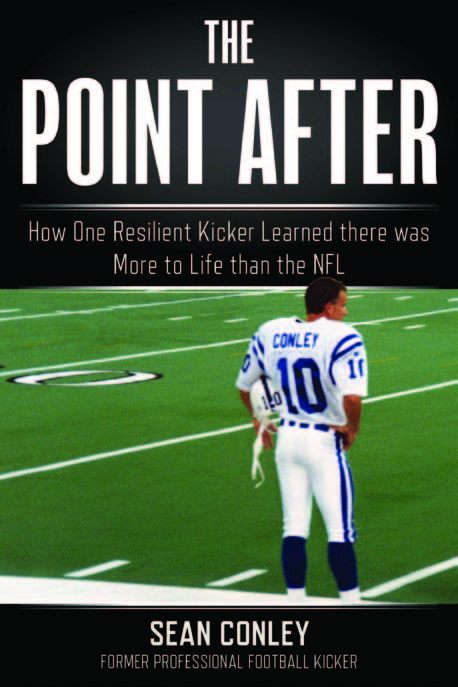Professional sports aren’t about moderation. They’re about pushing your body to the extreme to achieve great things.
Even as a young boy I felt that need to go beyond my limits and get better and better. My goal was to be a placekicker on an NFL team, a position that is as hard as any other but also has a unique set of pressures: as a kicker, you act alone. Scoring — or not — is all up to you.
Growing up in Erie, Pennsylvania, I played multiple sports: basketball, soccer, baseball, and my favorite, football. But I knew what I wanted. And by the time I entered college, I threw my training into overdrive; I was relentless. Whether on the field, in the weight room, running stadium stairs or doing sprints, I refused to listen when my body begged me to stop. I showed it no mercy. I was obsessed.
But prioritizing a goal over my own physical safety was a dangerous game, and the more I pushed, the more pain I felt. So I fell into a routine of masking the agony: I popped giant ibuprofens and took muscle relaxants — anything to be able to keep training and improving. The concept of rest was a non-starter. I could not conceive of taking it easy. Moderation was the opposite of what I was going for. I was going for perfection.
And I achieved it, for a time. Right out of college, I signed with the Detroit Lions. Soon after that, I signed with the New York Jets. I thought I was on my way, but within three years my body was broken. Plagued by injuries, I was released from the Jets. At 25 my career was over, and my body felt like it was 75.
They say that hindsight is 20/20. Had I known what I do now, I may have been able to avoid the repetitive use injuries that ended my NFL years. But I didn’t know how to train with any sense of moderation or balance. Too many athletes — especially in professional sports — don’t learn these critical lessons and wind up having to give up on lifelong dreams. Some of us are lucky enough to heal and find a new way to thrive.
In my case, I went on a long journey of coming to terms with my injuries, repairing the physical and emotional damage, and finding that balance I’d lacked. I’ve discovered that you don’t need to hurt in order to move — and if you cultivate a lovely relationship with your own body, you can sustain health and well-being for longer.
Here are three actions to take to harness the power of moderation, and create a relationship with your body based on compassion:
Respect Your Body
One of the key reasons I over-trained is that I did not respect my body. I didn’t believe it had a voice or needs because it was my body — and should be doing what I wanted it to do. Chasing goals, we wind up exhausting our bodies because we’re not respecting them. We drive our bodies too hard because we’re terrified that we’re not good enough to win — yet we become more and more addicted to competition. Our bodies are not just tools or machines. They are remarkable, amazing organisms that can be both amazingly strong and extremely fragile. To become more in tune with them, practice replacing the negative thoughts you have towards them with thoughts of gratitude. Focus on being grateful for how your body takes care of you and allows you to move throughout the day. First thing in the morning or whenever you can, practice this Gratitude Mantra: I am grateful for what my body can do.
Listen to Your Body
Our bodies are always trying to communicate with us. They do so through the language of sensation — that discomfort you’re feeling is a message, reminding us we need to take more care. But too often, we ignore what our bodies are trying to tell us. We may be too obsessed with competing or excellence, too insecure, too focused on our physical image or our conceptions of success. But we need to listen to our bodies, or they pay the price.
Create a healthy habit of listening to your body. When your body asks for rest, be mindful of its need for rest, and answer its call. When you feel pain, back off. As you move or work out, focus on the sensations you’re feeling until you understand what they’re trying to say. Try repeating this promise to yourself every day: I am listening to my body’s needs.
Breathe
Every day we average 23,000 breaths. But how many do we notice — how many are we actually aware we are taking? When we become aware of our breath, we become aware of the present moment. And it’s when we are in the present moment, that we can consciously pay attention to what our body is telling us at that moment.
Make a commitment to spend at least five minutes of every day doing some breath work. It could be while you’re meditating, practicing yoga, walking or jogging, or even doing the dishes. Quiet your thoughts as you focus on steady breathing. Pay attention to each breath in and each breath out. Say to yourself: I am breathing in, and I am breathing out. Concentrate on that stillness.
Yoga and meditation helped me enormously after I left the NFL. I had to be pushed into it — and I credit my wife, Karen, for that — but these practices worked wonders to heal my body as well as my mind. They helped me create a relationship with my body based on love and awareness. I understood when I was dishonoring my body, and how to slow down with compassion and respect. I’m still standing, still moving, and I now feel better than ever.
 Ex-NFL kicker Sean Conley (Detroit Lions, Indianapolis Colts, New York Jets) suffered career-ending injuries from overtraining. He began practicing yoga as part of his rehabilitation, and soon embraced yoga’s mindfulness, meditation, and philosophy as a new life direction. Now a yoga teacher himself, he owns Amazing Yoga in Pittsburgh, Pennsylvania with his wife. His new book is The Point After: How One Resilient Kicker Learned There Was More to Life Than the NFL (Lyons Press, 2020). Learn more at: seanconley.net.
Ex-NFL kicker Sean Conley (Detroit Lions, Indianapolis Colts, New York Jets) suffered career-ending injuries from overtraining. He began practicing yoga as part of his rehabilitation, and soon embraced yoga’s mindfulness, meditation, and philosophy as a new life direction. Now a yoga teacher himself, he owns Amazing Yoga in Pittsburgh, Pennsylvania with his wife. His new book is The Point After: How One Resilient Kicker Learned There Was More to Life Than the NFL (Lyons Press, 2020). Learn more at: seanconley.net.

















